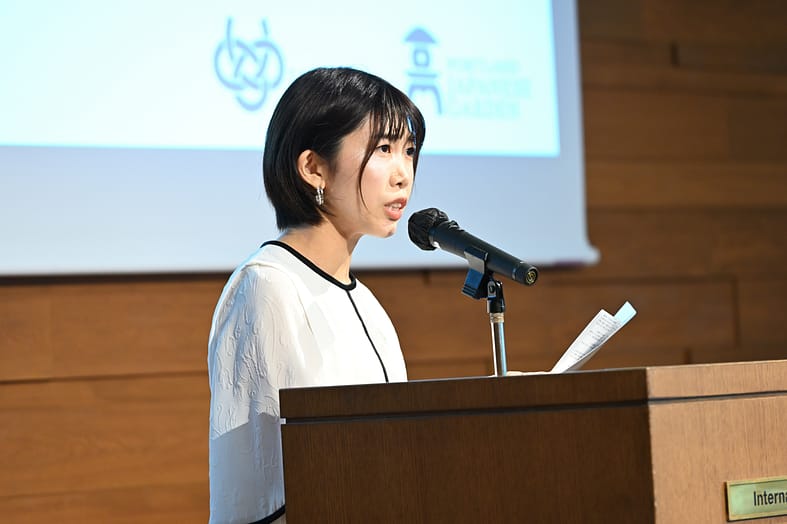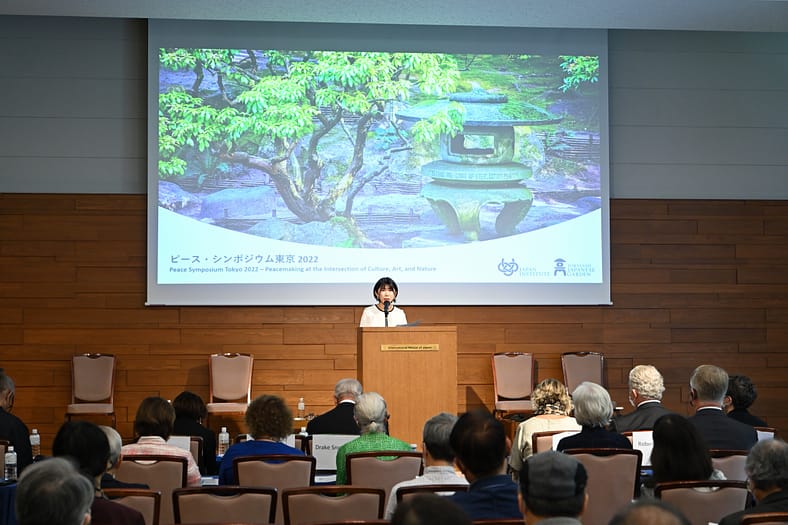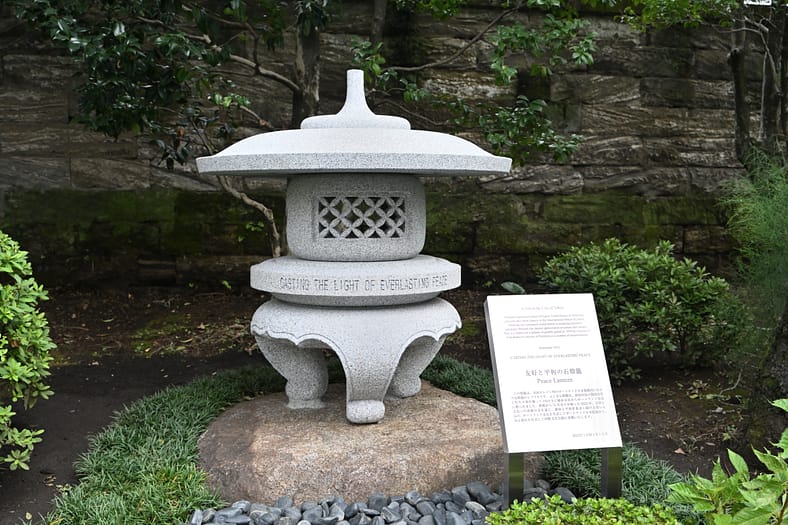
Japan Institute is holding six Peace Symposia on six continents, the first having been held in Tokyo, Japan on September 21, 2022. Among the highlights of a day filled with many was a commissioned poetry reading by Yumi Fuzuki. Fuzuki, recipient of the Gendai Shi Techō and Maruyama Yutaka Memorial Modern Poetry prizes, was selected by Japan Institute in partnership with the Poetry Society of the U.K., a globally respected organization founded in 1909 that advances poetry through its publications, competitions, and collaborations with international organizations.
This pursuit of a happier and healthier tomorrow radiates in Fuzuki’s work, Gathering the voices (available to read down below). Building off the heart aching consequences of violence, Fuzuki explores Japan’s unique perspective on peace and beckons us all to join her in listening to those who have survived calamity.
Attendees at the Peace Symposium were also given a printout of a poem by Hiromitsu Koiso. Titled droning, this work explores a personal moment of peace. It was written in the form of a haibun, a Japanese style of poetry in which prose is followed by a haiku. This is also available to read below.

Up Next: Peacemaking at the Intersection of Culture, Art, and Nature in London, England
It is Japan Institute’s pleasure to share that Victoria Adukwei Bulley has been commissioned for a poetry reading at Peacemaking at the Intersection of Culture, Art, and Nature, the organization’s Peace Symposium being held in London, England on December 6th, 2022. Bulley, an award-winning poet who has received multiple fellowships and held residencies in the U.S., Brazil, and U.K. has been praised by The Guardian, which wrote, “Adukwei’s spirited and generous work is not always quiet: there are overtly political poems, poems in experimental forms, and a number of spectacularly powerful prose poems, including a long and dazzling riff on ‘noise.’”
At the conclusion of all six Peace Symposia, Japan Institute will publish a book of the poetry that has been included in their programming. It will include work by winners of a challenge sponsored by Japan Institute and the Poetry Society of the U.K. as well as Fuzuki, Bulley, and other commissioned poets.

Gathering the voices, by Yumi Fuzuki
When August comes, “voices”
gather from across Japan.
Voices of war experience.
The aged survivors’
words tremble from anger and fear and
the youth who know nothing of war are convinced in their surprise.
“The wounds have not yet healed,” they say.
I spent the anniversary this year
with the story of a woman who was exposed in utero in Hiroshima.
Many soldiers who return from the battlefield
suffer flashbacks from PTSD, they say.
Unable to release the trauma,
they re-experience it all, against their will.
For them, it’s not the past, or an after-effect.
It is an imminent danger in this very moment,
and each time, their heart sheds blood anew.
Counseling techniques have advanced.
But I’ve never heard someone argue
that the deep harm caused to soldiers’ minds
is reason enough not to send them to battle.
In death tolls seen on screen, in the shadow of bombing raids,
are littered unspeakable damage
and unseen wounds.
How has “peace” come to be talked about in Japan?
The most widely known “peace” is the one in the Constitution,
long spoken of as an antonym for war.
In daily conversation, though, the meaning may indeed be different—
a calm and relaxed state of mind, it suggests.
This peace is not something that can be controlled with sheer force;
it exists softly inside one’s own heart.
And with it comes an assurance toward the world
which nothing can disturb.
The Japanese do not verbalize this,
so what is “peace” to us may seem a strange thing,
quite unlike other nations envision it.
A societal “peace” maintained through order and diplomacy
and this inner “peace” flow together,
gently rippling
at my feet.
When we think of peace,
let us look for the wounds.
So as not to cover over unseen injuries
with vague, big words.
So as not to close ourselves off
or turn our eyes from that hurt
in our desperation for tranquility.
So that above all else, we do not collude with those who cause harm.
In belief that we can change
our own selves for the better.
Let us listen to the voices
of those who survive.
And I will speak without hesitation
in this voice.
A new poem by Yumi Fuzuki
Translated from Japanese by Morgan Giles

droning, by Hiromitsu Koiso
when i went downstairs at midnight i noticed he was absorbed with humming in the kitchen. his nasal music was loud enough to hear clearly, & he went in a different direction with the melody line than expected. that was disappointing. i imagined he was actually a bassist, as half of human beings belong in the rhythm section. the radio was playing “ride of the valkyries” at full blast. he ignored the excitement of wagner & kept his droning at work–––a kind of riot. we were supposed to sleep, but he stuck to echoing his inner space. if the night washed over us, either i would stop his humming or just watch it wash us up. if the night silenced the arc of monotone music, we would go back to sleep.
a syllable rises & falls
tuned to the empty vase.
